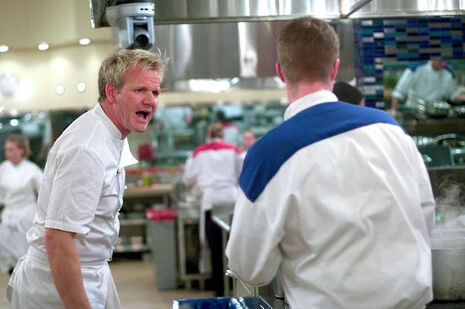Cocaine abuse in the hospitality industry is the symptom of a much larger problem
In light of Gordon Ramsay’s new documentary exploring the use of cocaine by those employed in the hospitality industry, Tasha Staines reflects on what working in a five-star hotel taught her about service

Something you learn when you grow up – people like cocaine. From students on a night out, to city boys on a night out, this white powder seems increasingly omnipresent. More surprisingly, it abounds in that five-star hotel you stayed in with your parents, or that fancy restaurant you went to on your birthday. The problem of cocaine within the hospitality industry has been highlighted recently by TV personality and head chef Gordon Ramsay. Ramsay lost chef David Dempsey in 2003 to the drug, and has decided to speak out in a documentary. In his words: “No one wants to talk about it, but they all want to f***ing snort it.”
Whilst it’s all very well to condemn the abuse of drugs at work, what does this say about the nature of the work itself? Zero-hour contracts have long been a source of political agitation, but what Ramsay’s recent documentary has highlighted to me is the very real price of working in this industry. Ramsay focuses on chefs, but this issue spreads right across the sector. While working in hospitality for a year, I myself was witness to cocaine abuse from the bottom level right through to management. Pinpointing a cause is key to finding a solution, and for that, one must critique the nature of the job.
Take the lack of routine. The set-up of a university degree can be taxing, especially if you are someone not used to organising your own time. It can be overwhelming to suddenly find yourself with a week’s worth of work to do, and about five contact hours total of guidance. The problem with zero-hour contracts is that there can be no routine at all; they remove flexibility from your life. When I worked in a five-star hotel as a waitress, my rota would often read 3pm until close. That means, until the job is done, which was often 3 o’clock the next morning. I didn’t have to stay in a job that gave me no life of my own and minimal breaks, but for some people, that is the only option of work available to them.
“A woman who was sat at the bar pointed at me and then said to her daughter, ‘that’s why you need to work hard at school.’”
Zero-hour contracts allow employers to treat their staff like machines and those who justify it cannot have experienced the worst of it. ‘Clopening,’ which means being on a late shift and then an early morning one the following day, creates a cycle of exhaustion that people find themselves trapped in. Is it any wonder they turn to substances?
There is also a huge pressure when working in hospitality to be welcoming. ‘Service with a smile’ is the motto, but when someone is struggling to get by on a minimal wage and has been at work for ten hours, this can be a real strain. If you are paying for a service you expect it to a certain standard and that’s completely understandable. But, the onus for that should be on the boss to ensure the welfare of their staff: unfortunately, more often than not, this is not recognised. This leaves us with a situation where people resort to the use of cocaine to sustain themselves through taxing conversations with customers and bosses alike.
Another influential factor is the stigma attached to working in hospitality. My boss told me that working a hotel used to be a career move; now, more often than not, it’s a minimum wage job to get by. I clearly remember a scenario where I was carrying a tray of drinks through the bar and my boss snapped at me that I was moving too slowly. A woman who was sat at the bar pointed at me and then said to her daughter, “that’s why you need to work hard at school.” Dealing with a lack of respect, both from employers and customers, can have a lasting effect on the mental health of an employee. It can leave you feeling that the job isn’t good enough for you and that you have failed. I once asked my boss if he was going to introduce his daughter into the hotel business when she grew up. He practically spat at me, “no child of mine will ever work in a sh*t place like this.”
Ramsay has done well to highlight a serious issue in society, but he hasn’t gone far enough. The use of cocaine itself is not the problem and without sourcing the main cause of grief, it is unlikely to stop. Zero-hour contracts exploit those who sign them, and in the end, this affects the customer too. Being aware of this goes some way to changing it, but maybe more importantly, also remembering it next time you handle a complaint in a restaurant or hotel
 News / Clare Hall spent over £500k opposing busway 24 December 2025
News / Clare Hall spent over £500k opposing busway 24 December 2025 Comment / The ‘class’ of Cambridge24 December 2025
Comment / The ‘class’ of Cambridge24 December 2025 News / Caius mourns its tree-mendous loss23 December 2025
News / Caius mourns its tree-mendous loss23 December 2025 News / Girton JCR publishes open letter expressing solidarity with Palestine25 December 2025
News / Girton JCR publishes open letter expressing solidarity with Palestine25 December 2025 Comment / Yes, I’m brown – but I have more important things to say22 December 2025
Comment / Yes, I’m brown – but I have more important things to say22 December 2025










